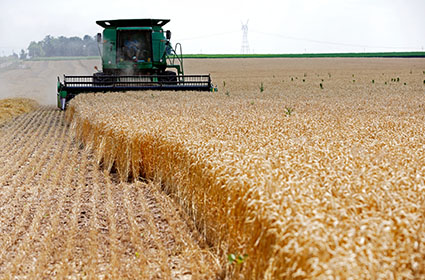Special to WorldTribune.com
“If we do not feed people, we feed conflict,” warned UN Secretary General Antonio Guterres addressing an urgent Summit on Food security in the wake of the ongoing Ukraine war.
“Global hunger levels are at a new high. In just two years, the number of severely food insecure people has doubled, from 135 million pre-pandemic to 276 million today,” warned the Secretary General.
That’s approximately the population of Indonesia!
Russia’s war on Ukraine, coming on the heels of an uneven global recovery from the COVID pandemic serves as a deadly roadblock to wider food production and distribution. For example, widespread fighting in farm regions of Ukraine has impacted on wheat production; yet shipping already produced food marooned in Ukrainian Black Sea ports such as Odessa actually poses the immediate challenge. Fortunately, some supplies are now being shipped from nearby Romania.

Long known and coveted as the breadbasket of Europe, Ukraine once served as a bountiful granary until Soviet mismanagement and then Josef Stalin’s state terror against the once productive farmers. Millions of Ukrainians died in the 1930’s from deliberate Soviet communist policies. Since Ukraine’s regained sovereignty in the 1990’s the country again has become a breadbasket especially for developing countries in Africa and the Middle East.
But combine wartime shortages, shipping bottlenecks and already higher food prices and it’s obvious that many countries will soon see serious shortfalls. Ukraine and Russia produce about a third of the world’s wheat and barley and more than half of its sunflower oil.
Antonio Guterres implored “there is no effective solution to the food crisis without reintegrating Ukraine’s food production, as well as the food and fertilizer produced by Russia and Belarus, into world markets — despite the war.” He stressed, “Russia must permit the safe and secure export of grain stored in Ukrainian ports.” Ukraine’s silos are filled for export, but ports are blocked by Russia’s navy.
Ironically, agriculturally-rich Ukraine now faces food shortages as a result of the war.
Again, the United States is taking the lead to coordinate global food assistance. A State Department fact sheet cites, “We have announced over $2.3 billion in new global humanitarian food assistance since Russia’s full-scale invasion of Ukraine, with a particular focus on countries hardest hit by food price hikes.”
U.S. Secretary of State Antony Blinken advised the Security Council, “As a result of the Russian government’s actions, some 20 million tons of grain sit unused in Ukrainian silos as global food supplies dwindle, prices skyrocket, causing more around the world to experience food insecurity.” Global food shortages remain an unintended consequence of the conflict.
Countries as varied as Lebanon, Somalia and Mali are feeling the shortages.
David Beasley, Executive Director of the World Food Program, delivered impassioned remarks to the Council that even before the Ukraine crisis, “just when you thought it couldn’t get any worse, Ethiopia. And then you thought it can’t get any worse, and then Afghanistan. And then when you really thought it couldn’t get any worse, Ukraine.” He added these crises come in addition to the existing severe droughts in the Sahel and the Horn of Africa.
Regarding Ukraine’s crop, WFP’s Beasley warned, “Over 36 nations get 50% or more of their food from this region…failure to open these ports in Odessa will be a declaration of war on global food security.” He added, “It will result in famine and destabilization and mass migration around the world.”
Tragically, the WFP estimated that a third of all Ukrainians are facing food insecurity.
Germany’s Foreign Minister Annalena Baerbock reminded attendees, “Russia is not only leading its brutal war with tanks, missiles and bombs. Russia is leading this war with another terrible but more silent weapon: hunger and deprivation.” She added, “By blocking Ukrainian ports, by destroying silos, and railroads, and especially farmers’ fields, Russia has launched a grain war, stoking a global food crisis.”
Facing this food emergency, how do we safely reopen the blocked supply chain bottlenecks at Ukraine’s ports? Alternative rail and roads can’t carry sufficient capacity to adjoining countries such as Poland and Romania. And there’s 20 million tons of grain; normally 6 million tons are shipped monthly.
While not suggested publicly there have been whispers on the diplomatic margins about forming a NATO multinational Sealift corridor with armed convoys into the Black Sea to get the grain out. Yet as with the controversial proposed “no fly zone” over Ukrainian land territory, this hypothetical plan bristles with risk and uncertain return. But the clock is ticking on resolution.
John J. Metzler is a United Nations correspondent covering diplomatic and defense issues. He is the author of Divided Dynamism the Diplomacy of Separated Nations: Germany, Korea, China (2014). [See pre-2011 Archives]

 By
By